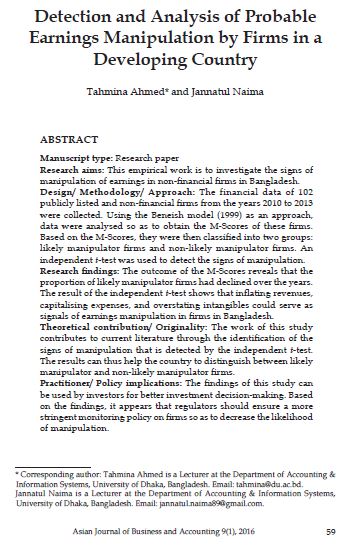Detection and Analysis of Probable Earnings Manipulation by Firms in a Developing Country
Main Article Content
Abstract
Manuscript type: Research paper
Research aims: This empirical work is to investigate the signs of
manipulation of earnings in non-financial firms in Bangladesh.
Design/ Methodology/ Approach: The financial data of 102
publicly listed and non-financial firms from the years 2010 to 2013
were collected. Using the Beneish model (1999) as an approach,
data were analysed so as to obtain the M-Scores of these firms.
Based on the M-Scores, they were then classified into two groups:
likely manipulator firms and non-likely manipulator firms. An
independent t-test was used to detect the signs of manipulation.
Research findings: The outcome of the M-Scores reveals that the
proportion of likely manipulator firms had declined over the years.
The result of the independent t-test shows that inflating revenues,
capitalising expenses, and overstating intangibles could serve as
signals of earnings manipulation in firms in Bangladesh.
Theoretical contribution/ Originality: The work of this study
contributes to current literature through the identification of the
signs of manipulation that is detected by the independent t-test.
The results can thus help the country to distinguish between likely
manipulator and non-likely manipulator firms.
Practitioner/ Policy implications: The findings of this study can
be used by investors for better investment decision-making. Based
on the findings, it appears that regulators should ensure a more
stringent monitoring policy on firms so as to decrease the likelihood
of manipulation.
Research implications/ Limitations: This study only highlights the
pattern of the manipulation of earnings in non-financial firms in
Bangladesh. Further studies need to be conducted in order to detect
the effect of changes in government regulations on manipulation
of earnings in Bangladesh.
Key Words: Accounting Red Flag, Bangladesh, Beneish M-Score,
Earnings Manipulation
JEL Classification: G30, M40
